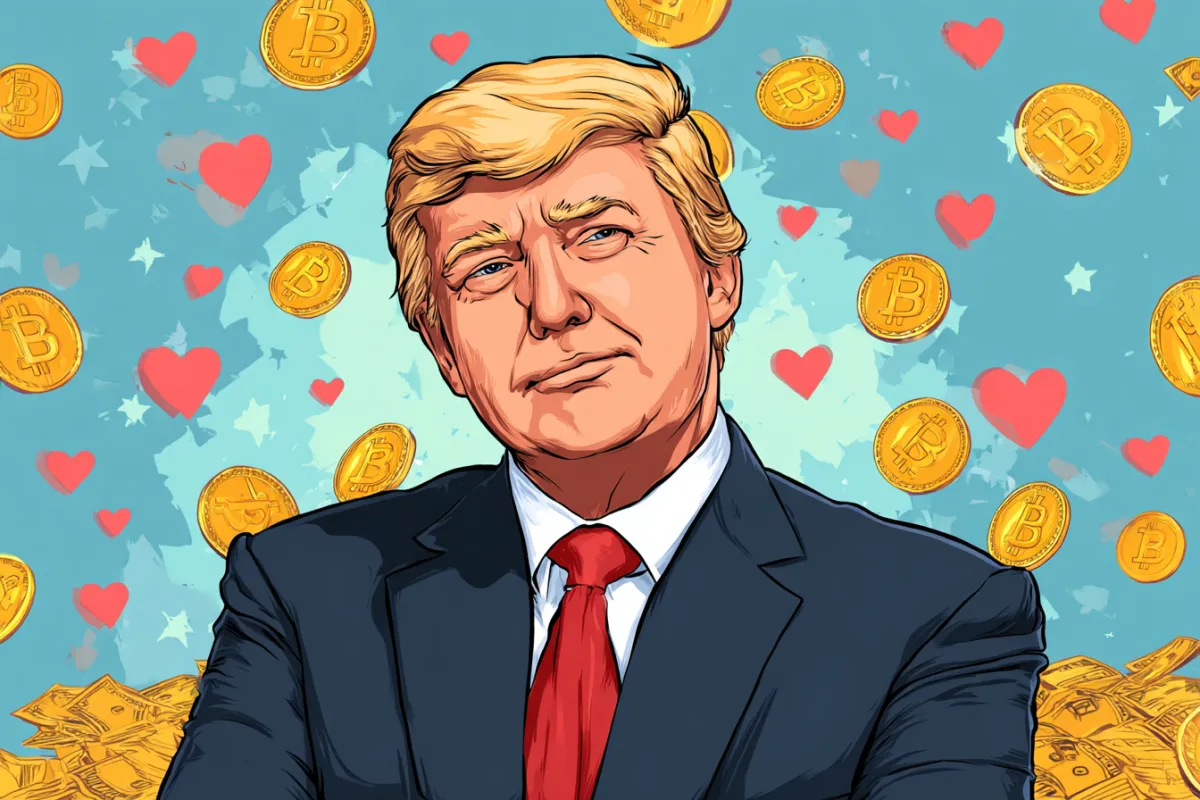The United States is positioning itself to become the crypto capital of the world, with President Donald Trump reiterating his vision of American dominance in the digital assets and technology sectors, with a particular focus on AI.
Yesterday, Trump made a bold speech in support of American leadership in Bitcoin adoption and innovation at the America Business Forum in Miami, Florida.
He pointed out that notable businessmen involved in the crypto space and other areas lend credence to the idea that the digital asset market is a big industry.
Trump says his administration has transformed the federal government’s stance on digital currencies, implementing numerous executive orders to legitimize them.
The president said: “We are making the United States the Bitcoin superpower, the crypto capital of the world. » He added: “Crypto was under siege. She is no longer” and has been very critical of the Biden administration’s hard line on Bitcoin.
Gary Gensler, the former chairman of the SEC, became known for his hard line on crypto by launching a series of enforcement actions against major exchanges, including Binance and Coinbase.
He resigned as SEC chairman on January 20 and was replaced by crypto advocate Paul Atkins.
Bitcoin eases pressure on the dollar?
Among the many benefits of Bitcoin, Trump mentioned how the asset has helped ease pressure on the dollar.
He said: “It takes a lot of pressure off the dollar. It does a lot of good things, but here we are. Biden was vicious on crypto. They were going after these crypto guys. It was terrible.”
Contrary to what Trump claims, this is not always the case. Bitcoin does not reliably alleviate pressure on the dollar; on the contrary, its relationship is complex and can present contradictions.
Sometimes a strong dollar can put pressure on Bitcoin, while at other times growing crypto acceptance could alleviate some of that pressure on the dollar by providing an alternative to traditional currencies or increasing volatility in the foreign exchange market.
Some perspectives suggest that Bitcoin’s role as a neutral alternative could strengthen the dollar’s position by protecting it against the weakening of other fiat currencies.
Those who hold alternative currencies could feel the consequences, as the value of Bitcoin will take a hit when the US dollar strengthens.
Bitcoin and other dollar-valued assets are seeing declining demand as the value of the dollar rises, and cryptos are losing some of their appeal as a hedge against falling fiat currencies.
It is similar to gold.
Research indicates that large trading volumes and price fluctuations of Bitcoin can impact fiat currency markets, increasing the volatility of the dollar.
This happens when market participants refine their approaches and manage potential risks.
Compared to more conventional assets like the dollar, Bitcoin’s price fluctuations are affected by a diverse set of variables, suggesting a degree of resilience that could be useful in certain contexts.
Due to current market circumstances, dynamics may change. Coinciding with an increase in the value of the dollar, we have recently seen a decline in the price of Bitcoin and stocks.
However, Bitcoin and gold have both risen sharply during periods of heightened concern over global debt or dollar decline, demonstrating their role as alternative assets in a “trade devaluation” bet.
Unlike fiat currencies used in everyday transactions or international commerce, Bitcoin is more of a “digital gold” as a store of value or speculative commodity.
An interesting protection against a possible devaluation of fiat currencies, which central banks can print infinitely, is their limited supply, capped at 21 million coins.
Trump’s adoption of crypto is real
Trump also put his money where his mouth was after making his case for cryptos.
The administration has taken many notable steps this year, including the creation of a U.S. digital asset stockpile and a strategic Bitcoin reserve.
Legislation regarding market structure is still in the works, but regulation of stablecoins was introduced by the GENIUS Act in July.
David Sacks, the White House AI and crypto czar, recently provided an update on the progress of the CLARITY Act, which has faced several challenges.
Ahead of the Senate Agriculture Committee meeting, Sacks, in an article on
He is optimistic about the progress being made and plans to collaborate on a project soon.
Thank you President @JohnBoozman & Senator @CoryBooker @SenBooker for a constructive discussion today on crypto market structure legislation before the Senate Agriculture Committee. I am encouraged by the great progress made thus far and look forward to a bipartisan effort in the near future.
– David Sacks (@davidsacks47) November 6, 2025
The crypto industry under Trump 2.0
If the current trend continues, the United States will overtake India as the most adopted Bitcoin market in the world this year.
North America has enjoyed benefits through well-defined laws, including support for spot Bitcoin ETFs and the formation of more structured institutional frameworks.
There has been a surge of institutional interest in stablecoin operations due to the GENIUS Act.
The Trump administration’s recent election results have raised questions about the future trajectory of its cryptocurrency policy initiatives.
Nonetheless, Trump’s bold moves and the progress the United States has made in the crypto sector underscore the commitment to making the country a leader in digital assets.
After Trump’s love of crypto, hedge funds are getting in on the action
Although traditional hedge funds have long been reluctant to invest in cryptocurrencies, Trump’s friendly attitude is now attracting them.
Bull markets haven’t achieved this before.
The percentage of traditional hedge funds holding crypto holdings increased from 47% last year to 55% in 2025, according to a recent survey by PwC and the Alternative Investment Management Association.
Despite ongoing volatility and uncertainty in cryptocurrency markets, 47% of institutional investors said the current regulatory climate has encouraged them to increase their holdings in the asset class.
Recent events, such as the appointment of pro-digital monetary agency leaders and the passage of the GENIUS Act, which establishes new rules for stablecoins, have had a significant impact on this sentiment.
The survey was conducted in the first half of 2025 and collected responses from 122 global hedge funds and institutional investors who were responsible for approximately $1 trillion in assets.
Of course, it is not only regulations that attract the most demanding investors.
There is a prevailing concern about losing major profits (FOMO), even if this means navigating the intense fluctuations that have recently affected digital currencies.
It remains to be seen whether Trump will be able to further strengthen American dominance in the sector through his policies.
Elsewhere
Fintech Reap expands its headquarters in Hong Kong to offer stable payment solutions
Platform processing volumes grow 8x in two years as company achieves profitability and targets global expansion
Ripple raises $500 million at a $40 billion valuation, led by Fortress and Citadel Securities
The crypto payments company reports $95 billion in trading volume as institutional investors support the expansion of stablecoins and prime brokerage.
Franklin Templeton Launches Tokenized Money Market Fund in Hong Kong
$1.6 trillion asset manager launches blockchain-native USD fund for professional investors as city advances digital asset hub ambitions
Bitcoin stabilizes at $103,000 as liquidity declines and volatility cools
Your daily access to the backroom
Marathon Digital Reaches $123 Million Profit Thanks to Bitcoin Miner’s AI Pivot
Company beats earnings expectations while announcing 1.5 gigawatt energy deal with MPLX to support its artificial intelligence expansion
Podcast
Shill VII License: Token Lists, Market Makers and Regulation, with Gracie Lin (CEO, OKX Singapore)
This episode of Blockcast’s Licensed to Shill features Gracie Lin, CEO of OKX Singapore, alongside regular panelists Nikhil Joshi, Lisa JY Tan and host Takatoshi Shibayama, who revisit the controversial topic of token listing practices on exchanges. The conversation focuses on the evolving roles of centralized (CEX) and decentralized (DEX) exchanges, with Lin emphasizing that regulatory clarity will ultimately guide the structure of the industry.
Do you like what you hear? Subscribe to Bulk broadcast on Spotify, Apple Podcastsor wherever you listen.
We are media partner of the next Singapore Fintech Festival! Use promo code SFFSMPBH for 20% off all delegate passes to this link!
Blockhead is a media partner of Consensus Hong Kong 2026. Readers can save 20% on tickets using an exclusive code BLOCK OFFICE has this link.










